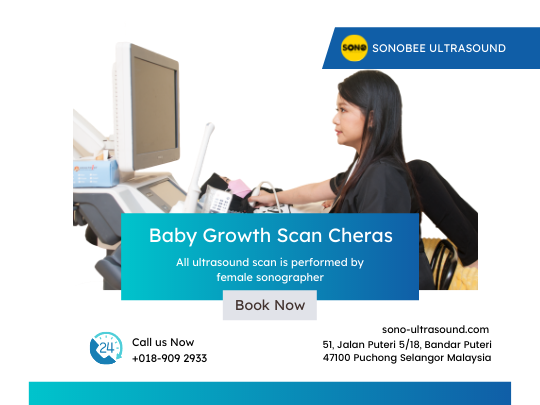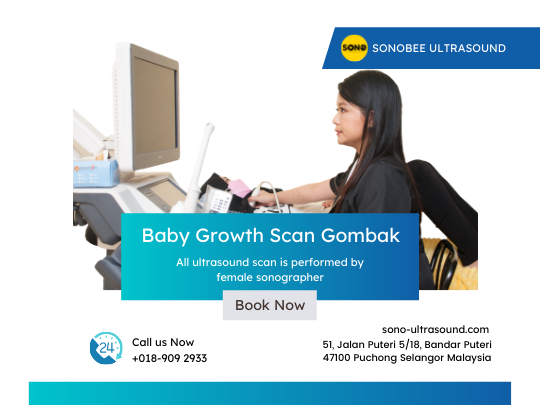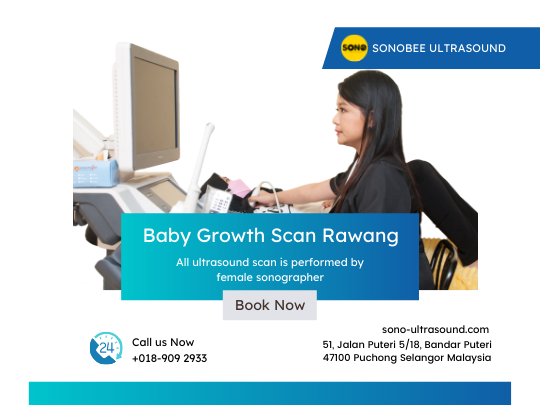What Does A 2D Growth Scan Check For ?
A growth scan is a procedure that is used to identify potential health problems in a newborn baby. A growth scan checks for problems such as low birth weight, growth problems, and problems with the central nervous system.
At the growth scan we are able to measure important growth parameters of your baby such as head measurements, abdominal/tummy measurements and limb measurements. This information helps us to provide an estimated weight of the baby and to ensure fetal development is on track for delivery.

Baby Growth Scan can be done as early As 4 Weeks
A 2D growth scan is done between 4 – 40 weeks of pregnancy. This measures and observes:
- Growth and well-being of baby
- Length of baby’s head, abdomen and thigh bone
- Amount of amniotic fluid around baby
- Baby’s activity
- Placental position
Growth scans help identify babies that are struggling and that need to be born early to keep them safe (Gardosi et al 2018, NHS 2019, RCOG 2013). Sonographer will check your baby’s size by measuring: The circumference of your baby’s head (HC). The circumference of your baby’s tummy (AC).
Growth scans can be done in the second half of pregnancy to assess the growth and well-being of the baby. During the scan, the baby’s head, abdomen and thigh bone are measured, the amount of amniotic fluid around the baby is assessed, the baby’s activity is observed and the position of the placenta is recorded.
Between 36 and 40 weeks, a growth scan can be done in the run up to your due date. This scan will again take your baby’s measurements, and make sure everything’s on track for you to deliver your baby as planned.
Are you looking for growth scan near me?

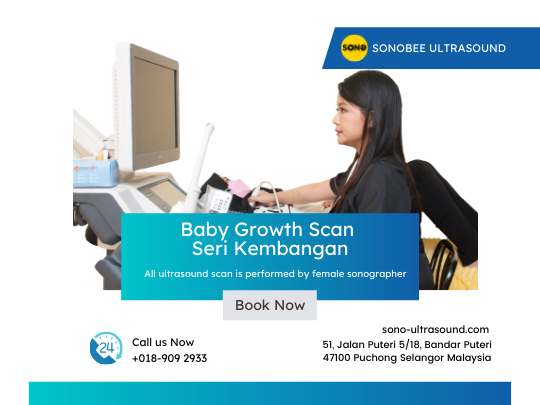


The Most affordable Baby Growth Scan Price in Malaysia
Baby Growth Scan Weekday Pricing
Every Monday to Friday ( 9am to 6pm )-
15 minutes 2D Scan time
-
Come as early as 4 to 40 weeks
-
Performed by Female Sonographer
-
Check Placental Position
-
Check baby's movement activity
-
Check baby's growth and well-being of baby
-
Check & measure amount of amniotic fluid around baby
-
Check & measure length of baby's head, abdomen and thigh bone
Baby Growth Scan Weekend Pricing
Saturday, Sunday & Public Holiday ( 9am to 6pm )-
15 minutes 2D Scan time
-
Come as early as 4 to 40 weeks
-
Performed by Female Sonographer
-
Check Placental Position
-
Check baby's movement activity
-
Check baby's growth and well-being of baby
-
Check & measure amount of amniotic fluid around baby
-
Check & measure length of baby's head, abdomen and thigh bone
Here's What Our Customers Are Saying About Us.

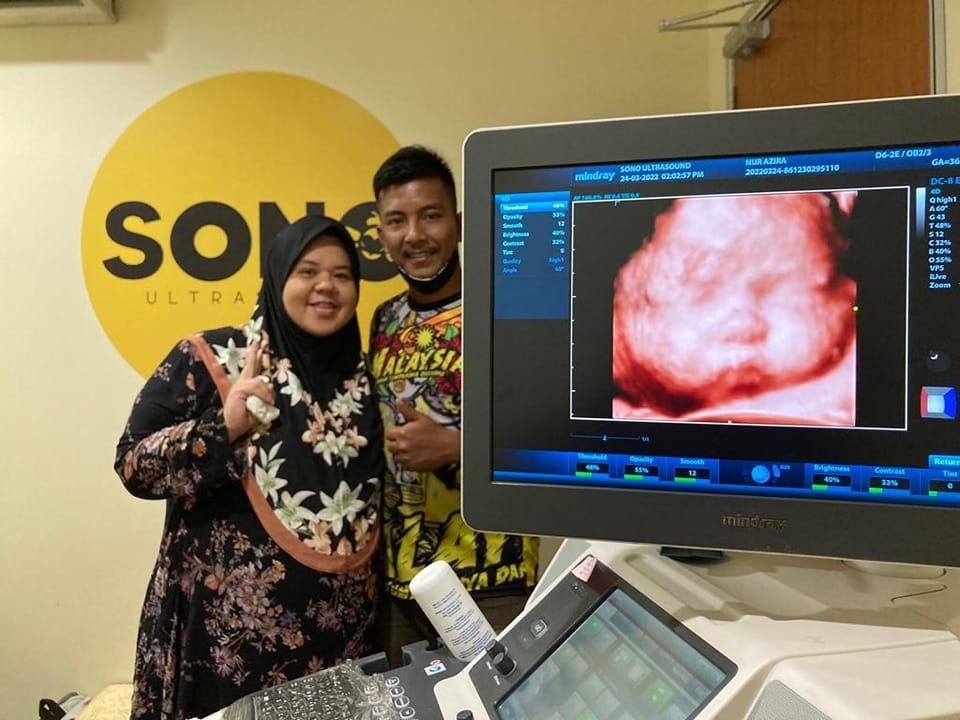

Frequently Asked Questions about Baby Growth Scan
Growth scans help identify babies that are struggling and that need to be born early to keep them safe (Gardosi et al 2018, NHS 2019, RCOG 2013). The person doing the scan (sonographer) will check your baby’s size by measuring: The circumference of your baby’s head (HC). The circumference of your baby’s tummy (AC).
A Growth Scan is normally done, between 28 – 40 weeks of pregnancy, to assess the growth of your baby and amount of liquor
Babies are diagnosed with intrauterine growth restriction (IUGR) if they appear to be smaller than expected. This would happen if an ultrasound indicates that the baby’s weight is below the 10th percentile for their gestational age (weeks of pregnancy). It’s also called fetal growth restriction (FGR).
What does being small mean for my baby? If your baby is small but healthy, he or she is not at increased risk of complications. If your baby is growth restricted, there is an increased risk of stillbirth (the baby dying in the womb), serious illness and dying shortly after birth.
But most babies who are small for gestational age have growth problems that happen during pregnancy. Many of these babies have a condition called intrauterine growth restriction (IUGR). This happens when the unborn baby doesn’t get the nutrients and oxygen needed to grow and develop organs and tissues.
This is ultrasound after 28 weeks, commonly much later. It may also be referred to as a growth scan or late Pregnancy Ultrasound.
Growth scans are medical scans and should last no more than 30 minutes. In this scan we check for the following: Check fetal growth. Assess placental position (low lying placenta at 20 weeks)
But most babies who are small for gestational age have growth problems that happen during pregnancy. Many of these babies have a condition called intrauterine growth restriction. This happens when the unborn baby doesn’t get the nutrients and oxygen needed to grow and develop organs and tissues. your scan, but this does not go into the level of detail required during an abnormality scan, which by itself could take up the entire time that you appointment is planned for, and would leave no time for you to bond with your baby or see them in 3D/4D. As a result, the wellbeing check doesn’t cover all the things that your midwife needs to see and know so its best to still keep up with all of your NHS scans and appointments.
The simplest way to gauge a baby’s size in utero is to measure an expecting mom’s fundal height. Fundal height measures the distance from your pubic bone to the top of your uterus in centimeters. Your health care practitioner will also palpate your abdomen to get an idea of your baby’s size
All scans fell within the accepted 15% margin of error, reassuringly 95% of scans gave an estimated fetal weight within 10% of the actual weight. Just under a third of scans estimated the fetal weight within 2% of the actual weight. Scans done at 40 weeks and beyond were more accurate than those done pretermnt
Strong abdominal muscles mean a growing uterus is going to stay closer to the core of the body, Kirkham explained, making a bump appear smaller. On the other hand, if core muscles have been stretched out from a previous pregnancy, a second or third pregnancy baby bump may look larger
In general, most women should start drinking approximately eight glasses of eight ounces of water each day for about a week before your ultrasound. If your doctor recommends a different amount, always follow your doctors instructions.
If your baby keeps gaining some weight, an early delivery (before the due date) may not be needed. But if your baby is not growing at all or has other problems, your doctor may decide that an early delivery could help. In this case, your doctor may want to induce labor.
An increased intake of fruits and vegetables or vitamin C at mid-pregnancy is associated with increased fetal growth and infant growth up to 6 months of age




